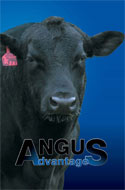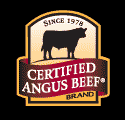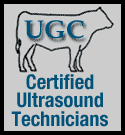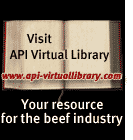University of Missouri and Industry Consortium To Announce High-Quality Cattle Strategy
The financial rewards for producing high-quality cattle can't be ignored today. Consumer demand is changing the industry.
The University of Missouri (MU) and a consortium of beef-related companies on Aug. 30 will announce a strategy for the industry to adapt to and profit from these new consumer preferences. This project will describe how cow-calf producers, stockers, feedyards and processors can work together to produce high-demand products.
"The U.S. cattle industry is nearing a critical point because of a shortage of cattle that grade upper-Choice or Prime," said David Patterson, professor of animal science at MU's College of Agriculture, Food and Natural Resources.
"The U.S. beef industry has operated for years on the premise that cattle are commodities and sold at an average price. Since the late 1990s, cattle have increasingly been valued on an individual-carcass basis rather than on an average live-price basis. As a result, higher quality grades have been rewarded."
Scott Brown, research assistant professor in agricultural and applied economics at MU, said that segmentation within the U.S. cattle industry has hindered adoption of newer production and marketing strategies. He said the new initiative will show how these various industries can better coordinate. Brown said such a program will result in a strategy that runs from conception to the dinner plate.
"Today there is often a disconnect between Missouri cow-calf producers and cattle slaughter/beef consumption. Producers sell calves and do not know the quality of the cattle they're producing," he said. "Their calves could be of very high quality, but they reap none of the financial rewards because they are sold for average prices as calves."
Working with MU on the project are Irsik and Doll Feed Services Inc., Garden City, Kan.; Pratt Feeders LLC, Pratt, Kan.; Accelerated Genetics, Baraboo, Wis.; Genex Cooperative Inc., Shawano, Wis.; and Select Sires MidAmerica with offices in Louisville, Ky., and Logan, Utah.
Consumers increasingly look for high-quality meat
Prices for meat products are going up, but prices for a high-quality product are going up faster.Brown said that today the maximum producer premium for Prime has reached $40 per hundredweight (cwt.). This is up from $12 per cwt. in mid-2009. He said there has been a steady increase in premiums for Prime as the U.S. recovers from the economic downturn.
"Demand for high-quality meat cuts drives premiums higher for beef from cattle with superior genetics," Brown said. "For producers, this can add $300 in revenue on an 800-pound (lb.) carcass."
There are clear signals from domestic and global consumers that they will pay more for quality beef, Brown said. Recently, Walmart allocated more space in its meatcase for higher-quality products.
"Producers should strive for more than average prices being paid for their cattle. High-quality cattle draw significant premiums when sold on a marketing grid," he added.
The Certified Angus Beef® (CAB®) brand sold 807 million lb. of premium brand products in 2011 — the fifth consecutive year of record sales, and one that represents an increase of 30 million lb., 4% more than the previous year. Sales of CAB products in restaurants have increased 12% — to a record 90 million lb. of product. An amazing feat in the worst economic downturn in decades, Brown said. "The beef business has changed," Brown adds. "As premiums increase for quality cattle, commodity cattle will lose ground."
Big economic impact for Missouri
The implications for higher profits in the cattle industry could have a significant effect on Missouri, which ranks third in beef cow inventory at 1.865 million head. Missouri cattle and calf receipts totaled $1.4 billion in 2010, ranking third among all Missouri commodities.
"The state's total economic impact is five or six times more than the direct cash receipts," Brown said. "A program that increases value in this market will promote positive growth in the state, particularly in rural areas in need of an economic boost."
Joint program needed to make change
Patterson and Brown said improvements in reproductive and genetic technologies within the beef industry warrant a collaborative approach to address all aspects of such a change."Our program will tie together AI (artificial insemination) industry partners and high-quality cattle producers with feedyards that know how to feed high-quality cattle," Patterson said.
There are already successes in this area, Patterson said.
"Breeding research at the MU Thompson Farm impresses me," Brown says. "They can boost the number of Prime calves from a herd."
Last year, 31% of Thompson Farm steers graded Prime. All graded Choice or better. The national average for Prime grades at processing plants runs just more than 3%. "Attention to breeding by selecting the right sires improves quality and raises prices," Brown says.
The daylong Aug. 30 announcement will take place in Columbia, Mo., at the Hilton Garden Inn Conference Center. The program will include a briefing from the consortium leaders on the merits and goals of the program. An afternoon session will provide specific details of the program to industry professionals, producers, the business and financial sector, regulatory and governmental representatives, trade and association representatives, and related industries.
Editor's Note: Release by the University of Missouri College of Agriculture, Food and Natural Resources Office of Communications.













